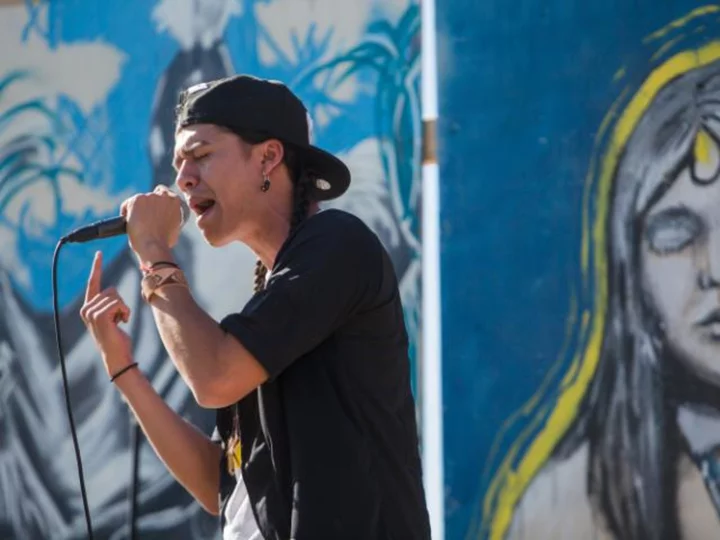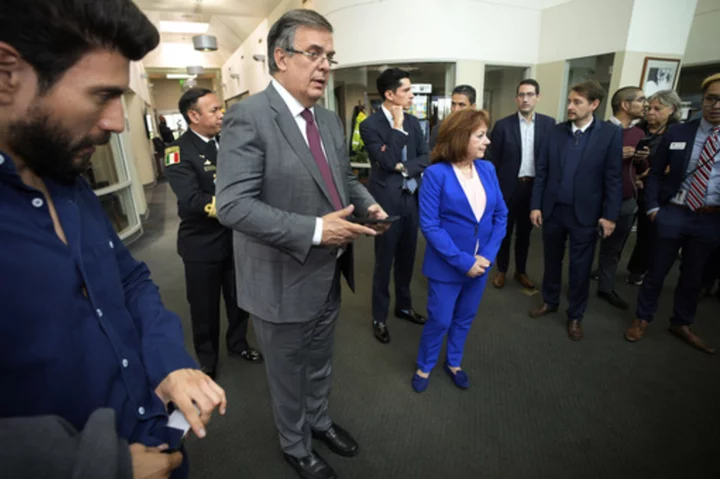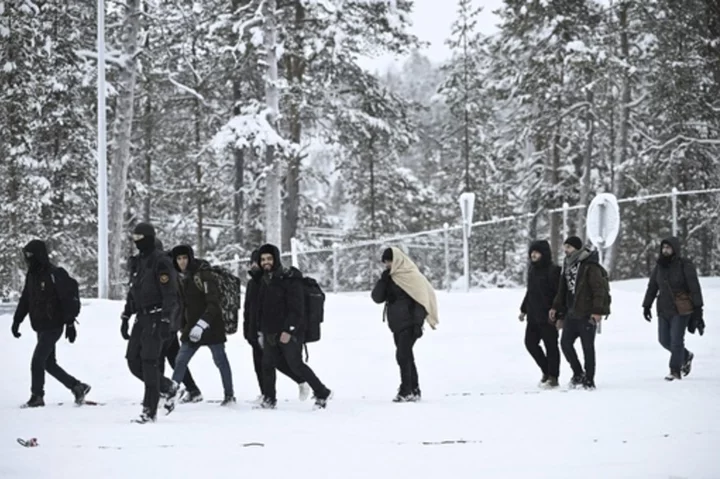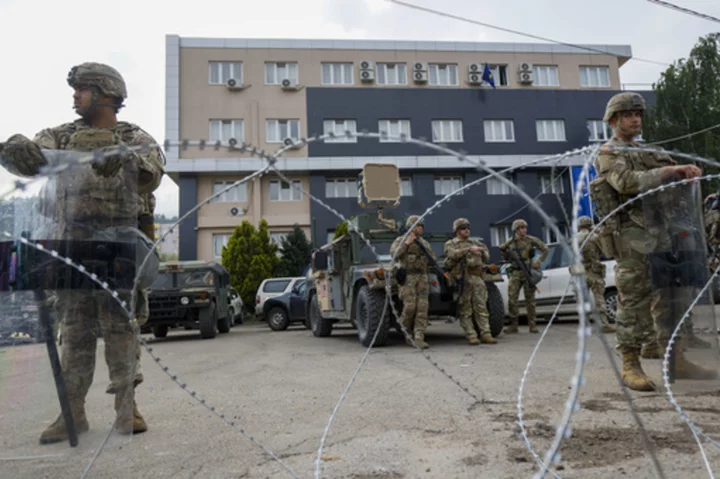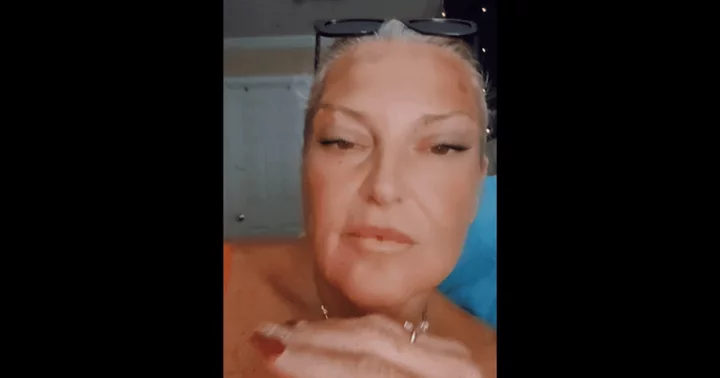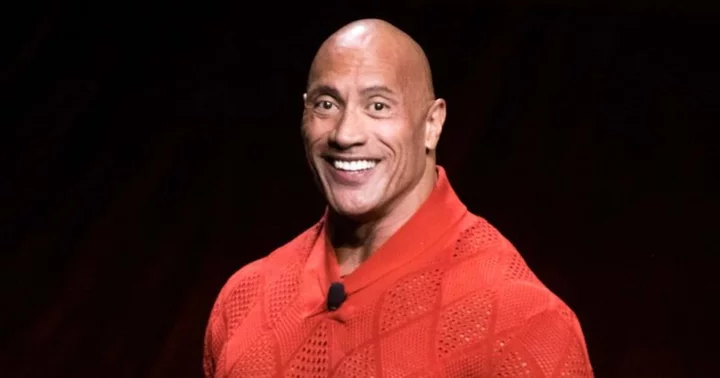When Frank Waln raps onstage, he is dripping head to toe in his culture. His long, braided hair frames his face, and Lakota jewelry gifted by relatives and fans hangs from his ears -- usually porcupine quills or buffalo bones -- as hand-woven bracelets wrap around both wrists.
A beaded medallion beats against his chest as he sings, his voice reverberating with pain and anger, every lyric sizzling with the fury of unavenged injustice.
"My people come from the land / On which you stand / Still fighting the white man," Waln raps in one of his songs, "My People Come From the Land," the English translation of Mita Oyate Ki Makoce Etanhanpi.
"Survivors of genocide the trauma's got me trapped / I used to keep it inside until I decide to rap / My ancestors ain't die for me to lie in my raps / Can't take it sitting down, instead I'm fighting back."
The Sicangu Lakota rapper, born and raised on the Rosebud Reservation in South Dakota, tours the world, merging hip hop and Indigenous music into distinctive, soul-stirring songs.
"I grew up in a place that used to be a literal death camp, where they marched my tribe to die. I was raised by survivors who could never talk about their trauma because they are still in survival mode," Waln, 34, said. "Even as a child who didn't understand it all, I felt all of this sadness inside me, and music helped me process that."
Surrounded by survivors of the atrocities of colonial violence, the award-winning rapper says he has always carried with him centuries of their heartache. Through music, he says, he found healing -- and the opportunity to take back the freedom American colonizers had stolen from his people.
Weaving Indigenous culture into American music
Waln was 7 years old when he found himself mesmerized by an old black piano sitting in his second grade classroom. One day before school, unable to resist any longer, Waln sat at the piano, pressing random keys and relishing every out-of-tune melody.
"I fell in love. I just remember touching those keys, hearing notes," Waln said. "Hearing music elicited an emotional response that nothing else did, and I've been chasing it since then."
Since that winter afternoon, he has taught himself how to play five instruments. Hip hop has inspired much of Waln's music -- among others, the album "StillMatic" by the rapper Nas -- but the musician has grown into his own unique genre.
While a majority of his songwriting is rooted in activism, calling out the ongoing injustices against Indigenous people and forcing listeners to acknowledge America's blood-soaked history, he doesn't always sing with anger.
Sometimes his voice takes a softer note. Other times he doesn't sing at all -- telling a story of pain and love only through the delicate notes of the Native American flute.
He centers nearly every song around the instrument, and often the drums, both fundamental components of Indigenous music.
"When people talk about the history of America and the Wild West, they think of the cowboys and the Indians, but when they think about the music of America, we are missing from the story," Waln said.
"I want to create my own genre that's rooted in Native music, Native culture and Native sound, that also becomes a space for other Native musicians who don't have a place in American entertainment and music culture," he said.
The musician, whose songwriting is rooted in the Lakota tradition of storytelling, also focuses on incorporating his Native tongue, often singing verses in the Lakota language.
'I'm very adamant about reclaiming my identity in a public space because my grandparents were punished and killed for it," Waln said. "Having that freedom, recognizing that shift in generations, means everything."
Reclaiming a culture that was once criminalized
While it may feel like America's history with the violent theft of Indigenous land and slaughter of Indigenous people was a long time ago, Waln says it hasn't been very long at all.
It was only 45 years ago that Indigenous people in the United States were allowed to resume practicing their cultural and religious traditions with the passing of the Religious Freedom Act in 1978.
"Every time I perform, there's people in the crowd who were alive when it was illegal for us to be Lakota. So, even though you know that history is in the past, it's very much impacted our reality," Waln said.
Waln, like most Indigenous people in America, has been directly impacted by settler colonialism, he says. His great grandparents, and many others on their reservation, lived through federal boarding schools as children, where they were violently forced to disconnect from their Indigenous cultures.
Harvard University's Peabody Museum of Archaeology and Ethnology has a sample of Waln's great grandmother's hair from when she was in boarding school. Waln's tribe is still in the process of requesting the return of the hair sample.
Indigenous children in the 19th and 20th centuries were given English names, banned from speaking their languages, had their hair cut, were prohibited from dressing in traditional clothes or jewelry and participating in their sacred ceremonies.
Along with forcibly assimilating children into White American society and separating them from their families, the children were also punished violently and hundreds died, according to the US Department of the Interior.
"This created a lot of trauma and PTSD in my whole tribe," Waln said. "It created a wall between us and our culture. We were disconnected because the people that raised us had to disconnect themselves from their identities just to survive."
"Some people want to say, 'well, your tribe got defeated, get over it,' not knowing the insidious nature of the colonialism, the way they went after us, not just with physical warfare, but also with biological and spiritual and emotional warfare," he said.
The impact of settler colonialism is still evident in America today, widely impacting Indigenous communities across the country. On the Rosebud Reservation alone, Waln says, poverty is rampant. Unemployment levels are over 80%, and violence and addiction have become a problem that desperately needs solving.
To continue experiencing the consequences of colonialism compounds the trauma experienced by both the old and new generations, Waln says.
"I use music to process this pain," he said. "In my culture, we look at medicine from a non-Western perspective. And music is medicine, so I'm constantly trying to find new ways to keep making new and better medicine for myself and sharing that with the world, for both Natives and non-Natives."
In his music, Waln makes no attempt to censor himself to make people feel more comfortable. His courage comes partly from his mother, he says, who always reminds him to speak from the heart.
"This country has a lot of heavy history to reckon with," Waln said, "and I'm not going to censor the truth."
Oyate Teca Obmani
When Waln talks about the day he sat at the piano for the first time, he laughs as he reminisces on every detail of the day he found his purpose.
"Since then, the moment I sit down and pick up an instrument, I know that I'm doing what I was born to do," he said, sitting in a Boston hotel lobby ahead of an event at Harvard University.
The musician travels the world, speaking at events and performing at tribal celebrations, universities and museums including the Smithsonian National Museum of the American Indian.
In the song "Concentration Camp Blues," he sings about the struggles of living on a reservation: "Concentration camp blues / Never make the news / These settlers rigged the game when they made the rules."
In "What Made the Red Man Red," Waln flips a racist song from the 1953 Disney animation "Peter Pan": "Your history books (lies) / Your holidays (lies) / Thanksgiving lies and Columbus Day / Tell me why I know more than the teacher / Tell me why I know more than the preacher / Tell me why you think the red man is red /Stained with the blood from the land you bled / Tell me why you think the red man is dead."
Other Waln songs focus on more personal struggles and often honor loved ones in his life, including his mother, one of his deepest sources of inspiration and a beloved spiritual leader who passed away in 2018.
"Music is like prayer for me," Waln said. "I wouldn't know what to do without music and my culture. I wouldn't be alive without them."
Along with hip hop, instrumental songs and Indigenous interpretation covers of music by artists like Fleetwood Mac, Waln has created his own blend of American music with Indigenous influences.
His evolving sound is showcased in his new song "Stardust," released Monday, Indigenous People's Day. It features Waln singing a poem he wrote over a piano piece. It highlights the significance of star knowledge for the Lakota, many of whom were astronomers, Waln says, and knew that bodies are made of the same particles as stars, far before Western science learned about it.
Despite his extensive accomplishments -- including three Native American Music Awards -- Waln measures his success differently.
"I define success from an Indigenous perspective. I wouldn't be on the right path if elders and people back home weren't supporting what I'm doing as an artist," he said.
Back on the Rosebud Reservation, Waln's community held a ceremony for him in 2013, when he was given his Lakota name, Oyate Teca Obmani, which means "walks with the young/new nation."
"My elders saw the impact I was having and how I was representing our culture and inspiring young Native people to be proud of who they are, to claim their Indigeneity, and that led to the name," he said.
Supported by his community and thousands of people -- both Indigenous and not -- Waln is on a mission to educate, heal and unite.
"Some people think we don't exist anymore," Waln said. "That's why I do what I do. Music is my weapon, my tool, to create change in the world."

